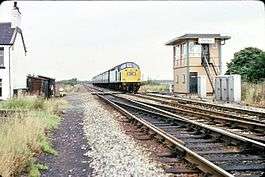Astley railway station
| Astley | |
|---|---|
|
Astley signalbox and level crossing | |
| Location | |
| Place | Astley |
| Area | Wigan |
| Coordinates | 53°28′14″N 2°27′01″W / 53.4706°N 2.4502°WCoordinates: 53°28′14″N 2°27′01″W / 53.4706°N 2.4502°W |
| Grid reference | SJ704973 |
| Operations | |
| Original company | Liverpool and Manchester Railway |
| Pre-grouping | London and North Western Railway |
| Post-grouping | London Midland and Scottish Railway |
| Platforms | 2[1] |
| History | |
| about 1844 | Station opened |
| 7 May 1956 | Station closed[2] |
| Disused railway stations in the United Kingdom | |
|
Closed railway stations in Britain A B C D–F G H–J K–L M–O P–R S T–V W–Z | |
|
| |
Astley was a railway station on the Liverpool and Manchester Railway on Chat Moss to the south of Astley village in what was then the county of Lancashire, England.[3]
History
Opened in the 1840s by the Liverpool and Manchester Railway, the station became part of the Grand Junction Railway on 8 August 1845. The GJR merged to form the London and North Western Railway on 16 July 1846. The LNWR became part of the London Midland and Scottish Railway during the grouping of 1923. The station then passed to the London Midland Region of British Railways on nationalisation in 1948 and was closed by the British Railways Board on 7 May 1956. It was subsequently demolished.[4]
From 1914 to 1970 a triangular junction 32 chains (0.64 km) east of the station linked the mineral line from Astley Green Colliery north of the Bridgewater Canal to the main line.[5]
The site today
Trains on the now electrified, more northerly of the two Liverpool to Manchester Lines still pass through the station site. The buildings have been demolished and a signal box built since the station's closure occupies part of the site. An electrical switching site is being constructed in the vicinity as part of the Manchester - Liverpool (via Earlestown) section of the NW electrification schemes. The level crossing is locked and unlocked by the signaller, but is operated manually by road users.
| Preceding station | Disused railways | Following station | ||
|---|---|---|---|---|
| Flow Moss | Liverpool and Manchester Railway | Lamb's Cottage | ||
References
Notes
- ↑ Fields, Gilbert & Knight 1980, Photo 56
- ↑ Butt 1995, p. 20.
- ↑ Smith & Turner 2012, Map 45
- ↑ Astley, disused-stations.org.uk, retrieved 23 November 2015
- ↑ Townley et al. 1995, pp. 326 & 387.
Bibliography
- Butt, R. V. J. (1995). The Directory of Railway Stations: details every public and private passenger station, halt, platform and stopping place, past and present (1st ed.). Sparkford: Patrick Stephens Ltd. ISBN 1-8526-0508-1. OCLC 60251199.
- Fields, N; Gilbert, A C; Knight, N R (1980), Liverpool to Manchester into the Second Century, Manchester Transport Museum Society, ISBN 0 900857 19 6
- Smith, Paul; Turner, Keith (2012), Railway Atlas Then and Now, Ian Allan Publishing, ISBN 978 0 7110 3695 6
- Townley, C. H. A.; Appleton, C. A.; Smith, F. D.; Peden, J. A. (1995), The Industrial railways of Bolton, Bury and the Manchester Coalfield, Part Two, The Manchester Coalfield, Runpast, ISBN 1-870754-32-8
Further reading
- Jowett, Alan (2000). Jowett's Nationalised Railway Atlas (1st ed.). Penryn, Cornwall: Atlantic Transport Publishers. ISBN 0-9068-9999-0. OCLC 228266687.
- Jowett, Alan (March 1989). Jowett's Railway Atlas of Great Britain and Ireland: From Pre-Grouping to the Present Day (1st ed.). Sparkford: Patrick Stephens Ltd. ISBN 1-8526-0086-1. OCLC 22311137.
External links
- The station on a 1948 OS Map via npe maps
- The station on an 1849 OS map via National Library of Scotland
- The line and mileages via railwaycodes
